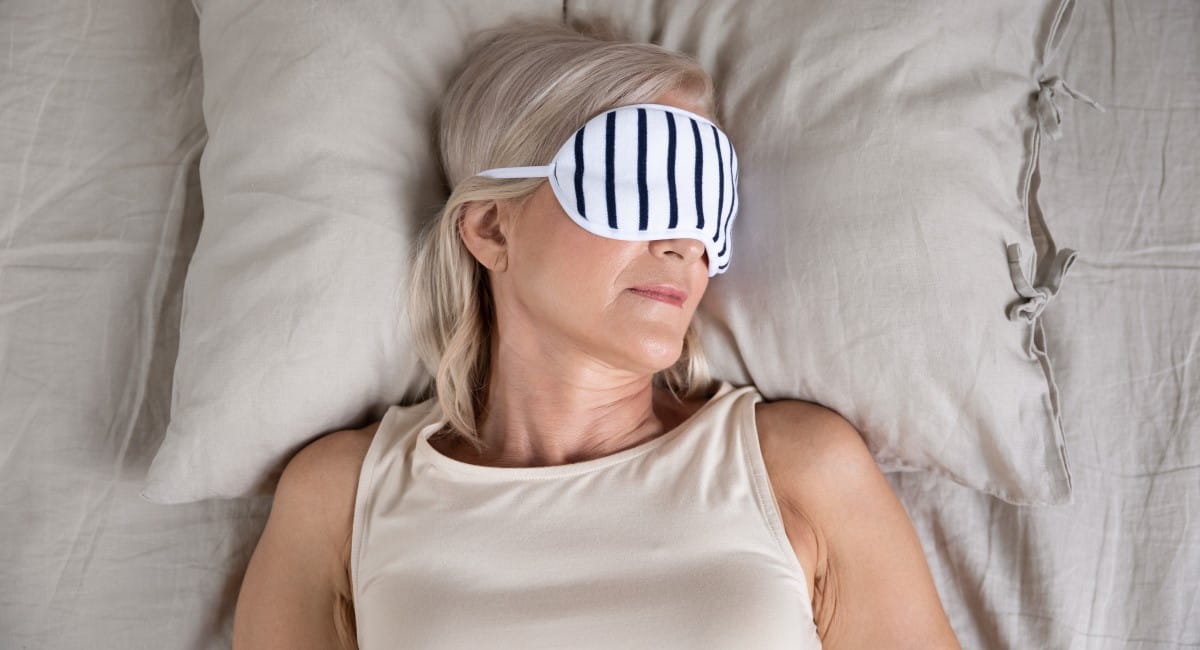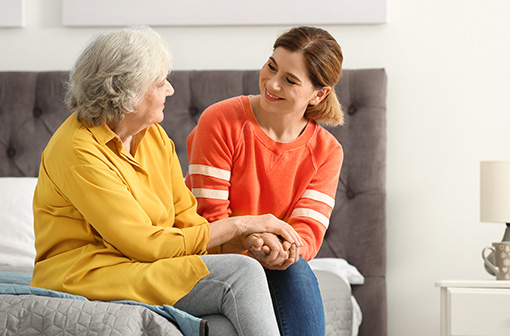“It’s OK to say you’re not coping and to either try to change things, get help from family and friends, or seek medical help.”—Dr Gemma Paech, Senior Sleep Scientist, John Hunter Hospital’s Department of Respiratory and Sleep Medicine.
Key points
- Sleep is vital for our overall wellbeing.
- There is no substitute for good sleep, so adjusting habits could be important.
- Seek professional help if lack of sleep continues to be an issue.
Sleep … we’re constantly told to get more. But what if life circumstances—for example, being a new parent, doing shift work or other health factors—prevent us from getting enough shut-eye?
We spoke to the experts to get their insight and advice on mitigating the impact of sleep deprivation, maximising the sleep we are getting and where to go for further help.

Why is sleep so important?
We all know sleep is vital for our wellbeing. If we don’t get enough, we don’t feel as good as we should. And it makes most things that little bit harder. But its impact reaches much further than the next-day implications of a poor night’s sleep.
We know with certainty some of the harm that can arise from a lack of a good night’s sleep.
Sleep helps keep our immune systems strong and allows the body time for growth and healing. In this way, it works on the whole body, keeping our heart and blood vessels healthy. It also helps control our appetite, weight, mood and supports our activities during the day, such as attention span, memory and learning capacity.
The recommended amount of sleep for adults is seven to eight hours of good quality sleep per night. This varies for children and also can reduce as you get older. However, seven to eight is a good benchmark to aim for as adults.
Often an inadequate or disrupted sleep is unavoidable, but we can make up the deficit in subsequent days. However, factors such as being a new parent, sleep problems caused by shift work, or underlying medical conditions such as anxiety and depression can mean an insufficient amount of sleep becomes the norm.
Asking for help is the best first step
The pressures of parenting and work may mean we simply attempt to forge ahead with less sleep. But that’s not sustainable—and opening up the lines of communication or seeking professional advice should be encouraged before the issue starts impacting on our health.
“Not getting sufficient sleep impacts general health functioning,” warns Dr Gemma Paech, Senior Sleep Scientist at John Hunter Hospital’s Department of Respiratory and Sleep Medicine.
“If you’re a shift worker and your roster and scheduling is preventing you from getting sufficient sleep, have a discussion with your manager and try to work out a way around it – whether that’s fewer night shifts, a slower rotating shift schedule, or more days off,” Gemma suggests.
Similarly, a new parent could ask a friend or a family member to help out. It’s important to talk to the people who care about you and make them aware that you’re having problems with your sleep.
“If people have tried to fix the problem and are having ongoing issues, they should really go their GP and get a referral to a sleep specialist. A sleep disorder could be the cause, or there might be medications that are appropriate to try,” says Gemma.
“Your doctor can talk to you about the types of problems you’re having and can organise for you to have a sleep study done to make sure there’s nothing else going on. They might also be able to provide more specific strategies that work for your health and situation.”
While advice from friends and family can be valuable, what works for one person may not necessarily be suitable for another. Take recommendations on board but carefully consider whether they are right for you. The same goes for information found online or on social media – is it from a reputable source or sleep professional? If not, be cautious.

Helpful tips if you can’t get enough sleep
It’s important to emphasise there is no substitute for sleep – and no health professional or sleep specialist will advocate a preventable lack of sleep. So if you’re burning the candle at both ends, changing your habits is far more preferable than looking for sleep shortcuts.
But if unavoidable circumstances are getting in the way of sufficient sleep, there are steps you can take that may help alleviate the effects, and ensure you are maximising the sleep you are getting. It’s also worth checking out other additional resources, such as those from the Sleep Health Foundation.
Napping
Take naps and short sleeps where possible. “If you can fit in a 20- or 30-minute nap, that can have some benefits. It can be short-lived – it’s not going to get you what a six- or seven-hour sleep is – but it might tide you over for a couple of hours,” says Gemma.
“But people should be aware that napping is associated with sleep inertia, that groggy feeling you can have immediately upon waking. I’d suggest not having a nap right before doing a safety-critical task like driving.”
Use caffeine strategically
While having a coffee first thing in the morning is deeply ingrained for many people, delaying your caffeine intake until you feel the most tired may have more of an effect. Meanwhile, avoiding caffeine and other stimulants, such as alcohol and nicotine, at least an hour before bedtime is advisable.
“Caffeine naps”
Coffee and napping would both be near the top of some people’s favourite things – and combining the two seemingly conflicting elements may be constructive. “By having a cup of coffee then having a short nap for 20 to 30 minutes, the theory is by the time you’ve woken up the caffeine absorbs in your system and soon afterwards you get a benefit from both,” explains Gemma.
Diet
It’s easy to fall into a trap of eating poorly if we feel perpetually tired and are not getting enough sleep, but good diet and good sleep go hand in hand.
“Try to eat the right types of food – healthy fruit and vegetables, good proteins and not opting for junk food. Foods high in sugar and carbohydrates, and highly processed foods can make us more sluggish and affect our mood,” says Gemma. “A healthy diet improves alertness levels during the day and reduces the risk of becoming overweight, which can lead to sleep disorders like sleep apnoea.”
Exercise
Getting at least 20 to 30 minutes of physical activity each day can help you to get a good sleep at night. “It doesn’t have to be super-physical, high-intensity stuff – even just a short walk can help,” says Gemma. “Going out and getting natural sunlight can also be really beneficial.”
Make your bedroom a sanctuary
Ensure you can rest in a quiet, dark, well-ventilated room that is not too hot or too cold. Other issues to assess are your mattress, pillow and bedding quality.
Reduce screen time
It’s important to switch off. It is recommended that all screen devices are turned off one or two hours prior to bed and are left outside the bedroom. The blue light of computer screens can reduce evening levels of the sleep-promoting hormone called melatonin.
Relaxation techniques
“Progressive muscle relaxation can be useful, while the mindfulness app Smiling Mind has been developed with sleep researchers,” says Gemma. “People can practice these techniques during the daytime, and it helps to change their mind and thought process.”
Avoid stress or worry
Some people have trouble switching off their thoughts in bed. Simple strategies can include having a relaxing sleep ritual, or ensuring that you set aside some time for “thinking” or “worry time” in the evening, making plans or writing worries or things to do down and then setting them aside.
Keep in mind that while these countermeasures can help minimise the effects of a lack of sleep on our performance and daily functioning, it is still not known how well they work in terms of reducing health risks associated with lack of sleep.
Don’t just “go it alone”
Ultimately, if these strategies are not helping your situation and your health and wellbeing continues to be compromised, it’s critical to speak up.
“It’s OK to say you’re not coping and to either try to change things, get help from family and friends, or seek medical help,” stresses Gemma.
“At some point you’ve got to take care of yourself. If you’re a new parent and you’re not taking care of yourself, you’re going to find it harder to take care of your child. You need to prioritise your own health. It’s hard to generalise, but don’t feel you have to persevere.”
Disclaimer: Information provided in this article is of a general nature. Australian Unity accepts no responsibility for the accuracy of any of the opinions, advice, representations or information contained in this publication. Readers should rely on their own advice and enquiries in making decisions affecting their own health, wellbeing or interest. Interviewee titles and employer are cited as at the time of interview and may have changed since publication.


